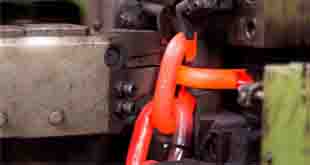Exceptional heat, chemical and flame resistance have contributed to widespread use of the rigid opaque thermoplastic Polyphenylene Sulphide (PPS) in a wide variety of applications. These include cooking appliances, sterilisable laboratory equipment, hairdryer grills, automotive components including exhaust gas return valves, carburettor components, ignition plates.
Its heat resistance combined with good electrical insulation properties means PPS has found use in electrical components in place of metals and some thermosets. Lamp reflectors need to withstand up to 250 degC, which is why they are still made mainly in thermosets or diecast metal. On the other hand, Tedur (PPS) is able to produce a surface finish that can accept vapour metallisation without the need for intermediate painting, as is normally the case with filled thermoplastics.
PPS can be prepared in a number of ways. For commercial purposes, PPS would be produced by the reaction of p-dichlorobenzene with sodium sulphide in a polar solvent. It can also be formed by polymerisation of p-halothiophenoxide metal compounds both in the solid state and in solution, or by condensation of p-dichlorobenzene with elemental sulphur in the presence of sodium bicarbonate.























